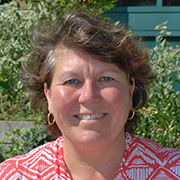CV: Dr. JoAnne McLaurin
By Eleni Kanavas
Bio basics: A senior scientist in Biological Sciences and the Brain Sciences Research Program at Sunnybrook Research Institute (SRI). Also a professor in the department of laboratory medicine and pathobiology at the University of Toronto. Completed her PhD in clinical biochemistry at U of T. Born in Hamilton, Ontario and grew up in Burlington, Ontario.
Why did you want to become a researcher?
Science was always my favourite topic at school. I went to Queen’s [University] and I did chemistry and I really liked it, except at the end of my fourth year, all these companies came to campus to recruit us. I looked at all the jobs and thought, ‘I don’t want to do any of that.’ So I jumped on a cruise ship for six months. It was my ‘What am I going to do?’ plan. When I decided that was a boring job, I became a research technician. I worked for Dr. Choy Hew, who was a professor at U of T, for two years. That’s when I went back to grad school.
What is your research focus?
I do Alzheimer’s disease (AD) research. We are looking to understand the disease process and how the brain starts to deteriorate and develop memory and cognitive deficits, as well as some of the psychological problems that go along with AD. In doing so, we actually discovered a drug that’s in clinical trials right now for AD; it’s for the neuropsychiatric symptoms. Sunnybrook is one of the sites of the international trial. They expect the trial to end early next year.
Since discovering that drug, what we know about AD now is that there is this big prodromal phase, where the disease is going on but you have no clinical symptoms. Much of the research is trying to understand what happens in that prodromal period. If we can understand that, [then] we might be able to intervene earlier once we have a drug. There will always be people who get AD, so the other side of my work is looking at what other drugs can we use or develop that will help patients such that their quality of life is better.
Why Sunnybrook Research Institute?
SRI has a strong Brain Sciences group, especially centered around AD and neuropsychiatric symptoms. There’s a number of people [doing this]. Together with the Physical Sciences group, and with all the imaging technologies that are available, it opens up so many more avenues of research with everything under one roof. The combination of the physical sciences and brain sciences really will provide a lot of opportunity for me.
Who do you collaborate with at SRI?
Dr. Isabelle Aubert, Dr. Bojana Stefanovic, Dr. Kullervo Hynynen and Dr. Sandra Black.
What is the most rewarding aspect of your job?
I enjoy the challenge of trying to figure things out and training my students. I think that’s a big part of what we do. I also like going out and talking about my work, not just to other scientists, but also to the lay community.
Are there any activities or hobbies you enjoy doing?
Golfing and stand-up paddle boarding on Lake Ontario in the warm weather.



